Imagine this scenario… on his first medical mission to Africa for which PRIP Rajendra K Saboo has become famous, “in Masaka in Uganda, we identified and collected the children who were screened by the surgeons and put them up in the very modest ward in the Government hospital.”
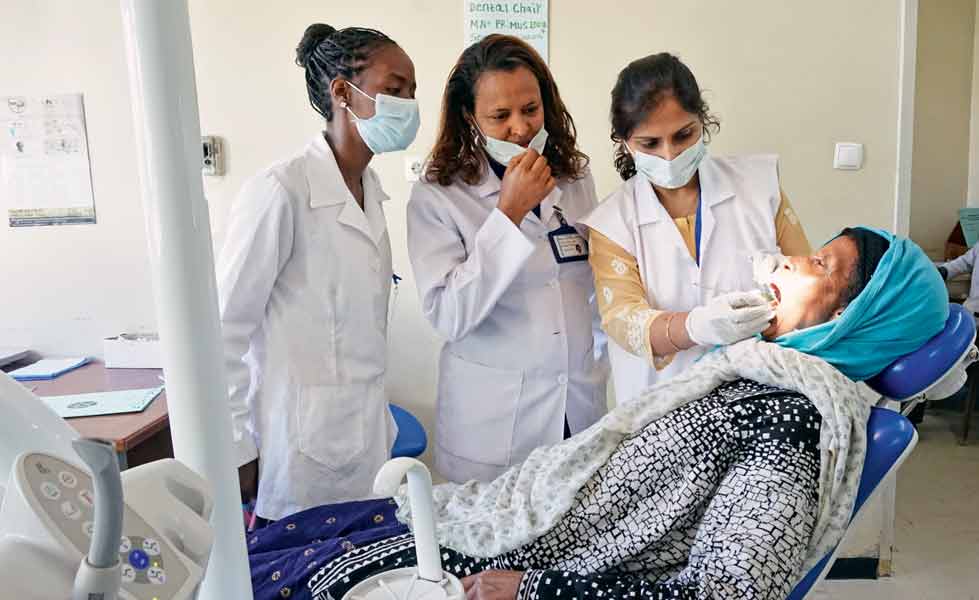
The polio corrective surgeries were to be performed the next day, but when the Rotary team reached the hospital the children were missing! “They all had just run away, not used to staying in a hospital. Somehow we collected them again and the surgery began,” he recalls.
Since there wasn’t adequate staff and the place required a good scrub “we got the cleaning material from the market and Usha, I and the American volunteers with us, started cleaning the place. And suddenly Usha said: ‘Do you remember what day it is?’”
He didn’t, but she did; it was August 11, and she said a simple ‘Happy birthday’ and went back to her cleaning task.
“Suddenly PDG Madhav Borate, one of the surgeons said: ‘Raja we need someone in the OT; there are no monitors to check the pulse of the patient. So please put an OT gown and come in.’”
A totally flummoxed Saboo protested: “But at the very sight of blood, I faint. He said nothing will happen, you come in.” He did as he was ordered, and was bang in the midst of the cutting of skin, bones, blood, flesh, chisels and hammers, “and yet nothing happened to me. This is the strength you get when you imbibe the spirit of service.”
When my 80th birthday was coming, I told Usha I want to spend the day serving in a medical mission; she agreed.
– PRIP Rajendra K Saboo
Outside the OT, Usha busied herself taking care of the children and their mothers. “It was total involvement from Day 1,” he recalls.
Beginning with a bang
Their first African mission kicked off bang in the midst of high drama. Barely 10 days before their departure, there was a bomb blast at the American Embassy in Tanzania, followed by another attack in Nairobi, Kenya. “They said the next target would be Kampala and the doctors asked if we should go, as their families were asking why are you going,” says Saboo.
While all this hullabaloo was happening, Usha met Shanti, a peace volunteer from Chandigarh working bang in the midst of the ethnic war in Croatia. “I asked her weren’t you afraid, and she said, ‘No, I have only one life to live, who knows when the end will come?’ That helped us make up our minds and also convince the doctors, who anyway, have the desire to serve. No matter how much we organise the money, matching grants or whatever, without the doctors’ wholehearted participation, these medical missions cannot happen. As Raja always says, we are only the organisers, they are the doers,” says Usha.
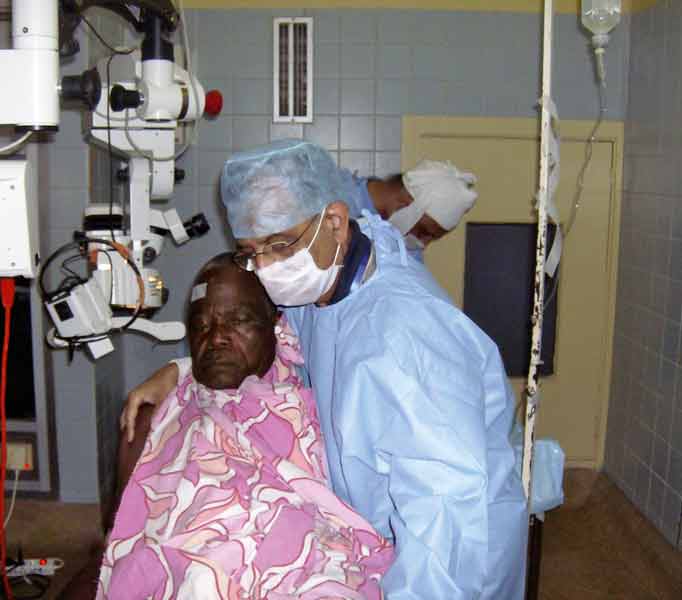
The amazing thing was, she adds, “despite the huge risk, not a single doctor dropped out.”
Saboo adds that from the Kampala airport they were transported in a kind of school bus with wooden benches for the four-hour journey to Masaka. “The eye surgeons went north to Gulu on a five-seater plane; Gulu was at that time the centre of the insurgency in Uganda. We found the infrastructure in the hospital to be far less than what we see in our civic hospitals in the district.”
How they began
Asked about the genesis of the programme, Usha says simply: “Africa was not planned, it just happened.” Saboo elaborates: “After my term as TRF Trustee Chair was over, Usha said we should now look for opportunities to do something with our own hands at least for 7–10 days… hands on service that we’ve been asking others to do.”
Also, his theme as RI President was ‘look beyond yourself’, and India had always been a receiving country, always seeking help. When he asked himself what India could give, the answer was that “we are very strong in medical sciences; we have the latest technology and our surgeons are world class. So can we give something through them, I thought.”
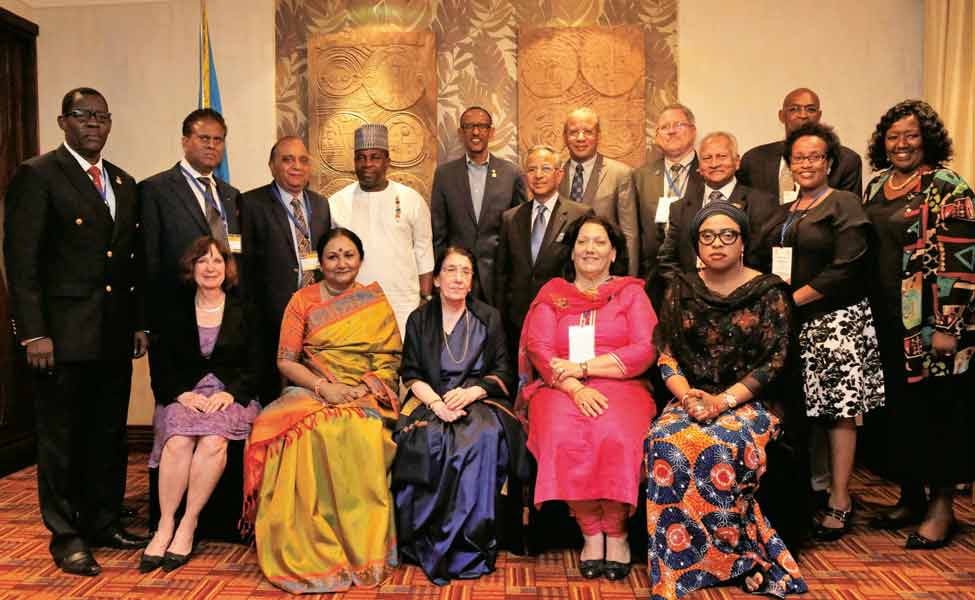
As a senior Rotary India leader, Saboo was involved in polio corrective surgery right from inception in 1979 “when we took the decision to immunise the children of the world.”
In 1997, when Rajiv Pradhan was the DG of District 3132, he invited Saboo for a polio corrective surgery camp in Pune. It was a matching grant project and the American Rotarians, mentioned earlier, were also present. “I suggested why don’t we go together to Africa to do the same work. And they agreed.” Africa was chosen because it had lots of polio cases and needed medical assistance.
Usha intervenes to point out a vital link — Nandalal Bhai who had once lived in Uganda, before settling down in California. “He knew Africa very well and said if you want to go to Africa, I will take you there.”
This also matched Saboo’s wish that India should now “give”. Apart from orthopaedic surgeons, three eye surgeons were also included.
Challenges
On the challenges thrown up by these missions, Saboo says each mission has its unique set of challenges. While in some places the facilities and infrastructure are inadequate, in others there are no patients, to begin with. For example, during their first visit to Nigeria, the eye surgeons got busy right from Day 1. But they did not have proper autoclave facilities for their instruments. “But the unique thing about our doctors is that while they have the latest technology and most advanced knowledge, the Indian word jugaad fits them so well… they can innovate on the spot.”
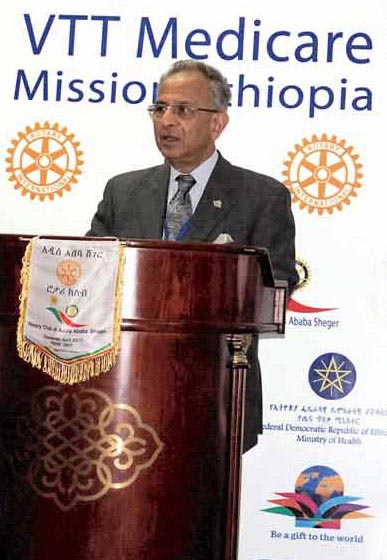
So once in Nigeria, while the operation was on, the power failed; the generator was started but conked off within two minutes. And all this while an eye surgery was in progress. “Dr Garewal from Chandigarh, a leading eye specialist, said: ‘Saboo Saab, meri bag mei torch hogi, le aiye.’ (There should be a torch in my bag, please get it.) So I held the torch and he completed the eye surgery which is such a precision surgery.”
Now, of course, veteran surgeons of the medical missions often carry their own equipment; it makes their work easier. Saboo never tires of saying that “the doctors are the real heroes in these missions; we only bask in their glory.”
Government clearances are another hassle; “In Rwanda the government always lays out a red carpet for us,” says Saboo. When Saboo requested PRIP K R Ravindran to join one of the African medical missions, “I suggested Rwanda because this was my fourth trip there and we know the infrastructure. And though a small country, it has the potential of moving forward speedily,” he says.
Thanks to the good offices of the First Lady, who Saboo knew from a previous trip, the President of Rwanda called upon not only Ravindran, but dropped in later separately, to meet each of the doctors and “spent 40 minutes with us.”
Lessons learnt
Saboo has organised 24 medical missions to Africa since the first one in Uganda. So what lessons have these missions taught him? How have they changed him as a person, I ask him.
“Well, what has changed is my own thinking and my own prejudices. The first prejudice was that we are superior and the Africans countries are still developing, while we have developed already and we can give them much. But when I was there I realised that the children, regardless of their colour, nationality or religion, are the same. If in pain they will cry, if tickled, they smile or laugh.”
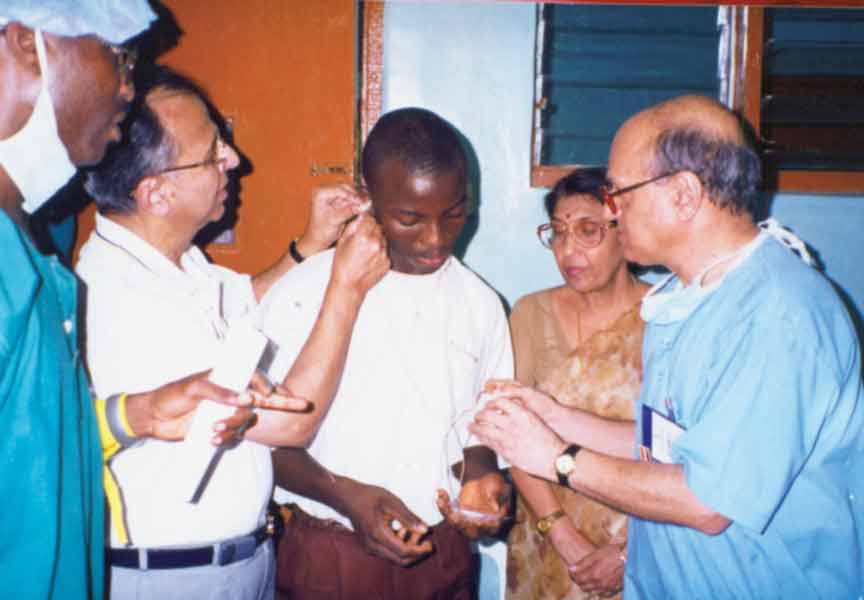
Another thing he has learnt is that “Rotary is not just about positions.” He was really moved by the human stories of pain and suffering; “they hit me and made me realise the value and importance of service… they are giving us the opportunity, and we can’t claim that we, as the givers, are superior.”
But having reported on the medical mission from Ethiopia (Every time… for Africa https://wordpress-132319-5230970.cloudwaysapps.com/every-time-for-africa/ — Rotary News December 2015), I suppose another lesson they’ve taught him is not to get perturbed by umpteen hurdles and obstacles. One of the first hiccups was Customs clearance… the Indian delegation was carrying surgical equipment, disposable theatre material, and boxes of medicines; and all of it was first stopped at the airport. But Saboo remained calm, and soon the Ethiopean DG and his team had taken over; they rushed to the Health Minister’s house, got the required clearances, the consignment was cleared and the doctors began their work. Said a relieved Saboo, “Bureaucracy is everywhere, it has no borders; Ethiopia is no exception but Rotary too has no borders!”
He is grateful to the doctors and volunteers, particularly PDGs Ranjit Bhatia, Madhukar Malhotra, Drs R S Parmar and Rajan Sharma. “Volunteers spend their money for travel and hotel, if not provided by the local administration.”
The most recent mission has been to Gabon with 20 doctors and 7 volunteers; “At the Delhi Immigration, the officer asked where Gabon was!” They were cleared from the airport “within 45 minutes, with gratis visa, and their baggage, including 92 pieces of medicines and equipment. After Rwanda, this is another country which welcomed us thus,” says Saboo.
But while the hospitals were sparklingly clean with modern equipment, they lacked trained manpower to use it. He is grateful to PDGs Ranjit Bhatia and Jean-Pierre Duboze of D 9150 and TRF, for making this mission a huge success.
He often asks himself if the money and time spent on such medical missions are worthwhile. “But then should we look at patients as numbers? Each patient is a life and if saved, or given a better quality, isn’t that good value? They are part of humanity and Rotary is committed to serving humanity.”
A special birthday
Over the years, the African medical missions have become so dear to Saboo, that “when my 80th birthday was coming, I told Usha I want to spend the day serving in a medical mission. She agreed that nothing could be better; but we had to convince our children and grandchildren. They agreed and arranged my birthday celebrations earlier.”
What he didn’t know on the actual day, which he spent doing what he normally does as a “volunteer” in these medical missions — pushing trolleys, transferring patients in and out from the operation theatres, etc — was that the group was planning a big bash for him. “But I had some idea because when we went down for breakfast, every doctor and volunteer wished me but said don’t tell anybody because we aren’t supposed to know! In the evening there was a big celebration with the local Rotarians participating, but I was very happy that my day was spent on service.”





